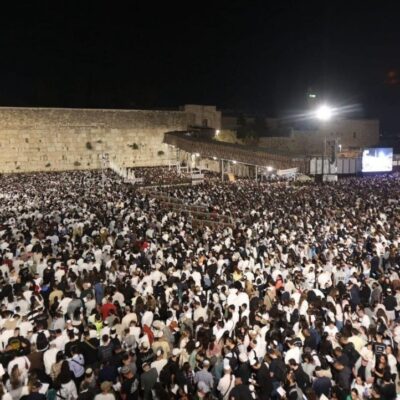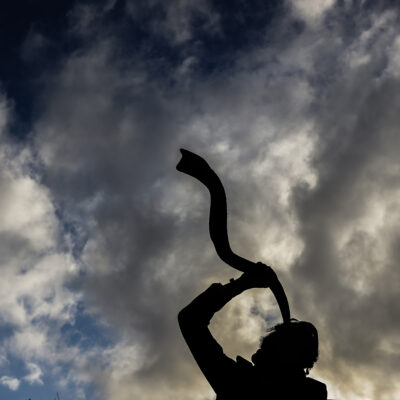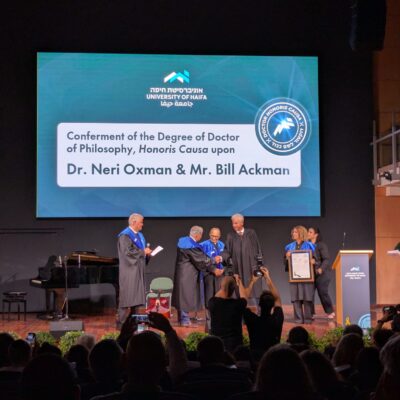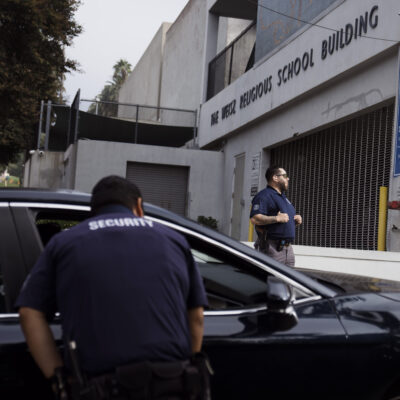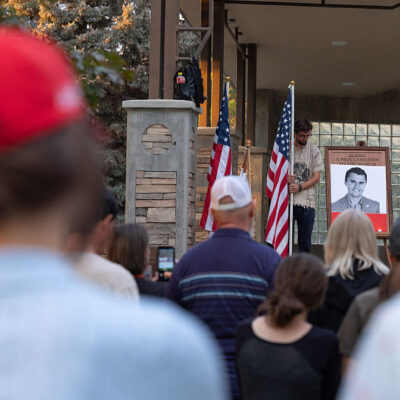Your Daily Phil: From last Rosh Hashanah to this one
Good Monday morning.
Ed’s note: In observance of Rosh Hashanah, the next edition of Your Daily Phil will be back in your inboxes on Thursday, Sept. 25.
In today’s edition of Your Daily Phil, on the eve of Rosh Hashanah, we reflect on the past year and what the next has in store for the Jewish People. We speak with experts about the state of food insecurity in Israel and report on a new grant by the Jewish Federations of North America to bolster northern Israeli farmers. We feature an opinion piece by Lori Palatnik spotlighting the efforts of Momentum alumnae since Oct. 7, 2023, and the mission for all of us in 5786; and one by Rabbi Simcha Scholar with a Rosh Hashanah lesson gleaned from the children and families supported by Chai Lifeline. Also in this issue: Rabbi Avi Weiss, Bruce I. Jacobs and Robert French.
What We’re Watching
Rosh Hashanah begins tonight.
Diplomats from around the world are en route to New York for the United Nations General Assembly, which officially begins tomorrow.
What You Should Know
A QUICK WORD FROM EJP’S JUDAH ARI GROSS
The picnic lunch that we planned with friends last Rosh Hashanah had to be relocated from the park to the courtyard outside our synagogue in our small northern Israeli town. We had to be close enough to a bomb shelter in case of a missile attack by Lebanon’s Hezbollah. Israel, at the time, was in the throes of a major ground campaign in southern Lebanon against the Iran-backed terror group.
This year, such precautions are not front-of-mind for most Israelis, even as the war in Gaza drags on and Yemen’s Houthis continue to fire ballistic missiles and drones at Israel, mainly to the country’s center and its southern tip of Eilat. Over the past Jewish year, Israel has significantly diminished the capabilities of Hezbollah and set back Iran’s nuclear and ballistic missile programs. And yet, nearly two years after the Oct. 7 terror attacks, 48 hostages remain captive in Gaza, and the Israeli military estimates that its latest offensive against Hamas in Gaza City will take at least several months, despite diminishing support for the war within Israeli society.
Israel’s national security is only one way in which the coming year differs from last. There is a new president in the White House, albeit one serving his second term in office, along with a Republican majority in Congress, which are both advancing policies with profound effects on philanthropy and the Jewish community: from changes to the tax code that are expected to reduce charitable giving to cuts to federal grants, which philanthropic foundations are increasingly being called in to fill.
The coming year may be one of the most consequential in Israel’s relationship with the Diaspora, particularly American Jewry. Yesterday’s rhetorical recognition of Palestinian statehood by a growing list of Western countries, including the United Kingdom, Australia and Canada, may prompt the Israeli government to formally annex the West Bank, effectively ending the prospect of a two-state solution, which the majority of American Jews still support.
Alongside the differences, this coming year is also seeing the continuation of existing trends. Security concerns remain a top priority during these High Holy Days, following two deadly attacks on Jewish events over the past year, as well as multiple arson attacks on synagogues, Jewish institutions and Jewish figures around the world. Though “the Surge” has diminished somewhat since it was first identified in the wake of the Oct. 7 attacks, that increased engagement in the Jewish world has continued and still represents an opportunity for Jewish organizations to bring fresh faces into the Jewish community and capitalize on the existing ones looking to do more.
Though Israel is still at war, the country is increasingly shifting to reconstruction and to navigating a new reality in which the country’s social services receive a smaller share of the state budget. The fissures in Israeli society that had been pushed to the back burner in the wake of the Oct. 7 attacks — between right and left, religious and secular, Haredi and non-Haredi, Arab and Jewish — have come screaming back.
We bring in 5786 at a fraught time, and many of the people steering us through it are deeply concerned. A recent survey by M²: The Institute for Experiential Jewish Education found that only a small minority of Jewish communal professionals — 24% — feel hopeful about the future. In light of all of the aforementioned challenges, it is not hard to understand why. But as we begin reading the Rosh Hashanah liturgy, we are reminded that our fates are not yet sealed. We have the power to ensure that the Jewish People are inscribed into the Book of Life for the coming year: “For repentance and prayer and charity annul the evil decree!”
HUNGER PANGS
Ahead of Rosh Hashanah 5786, experts predict another year of food insecurity in Israel
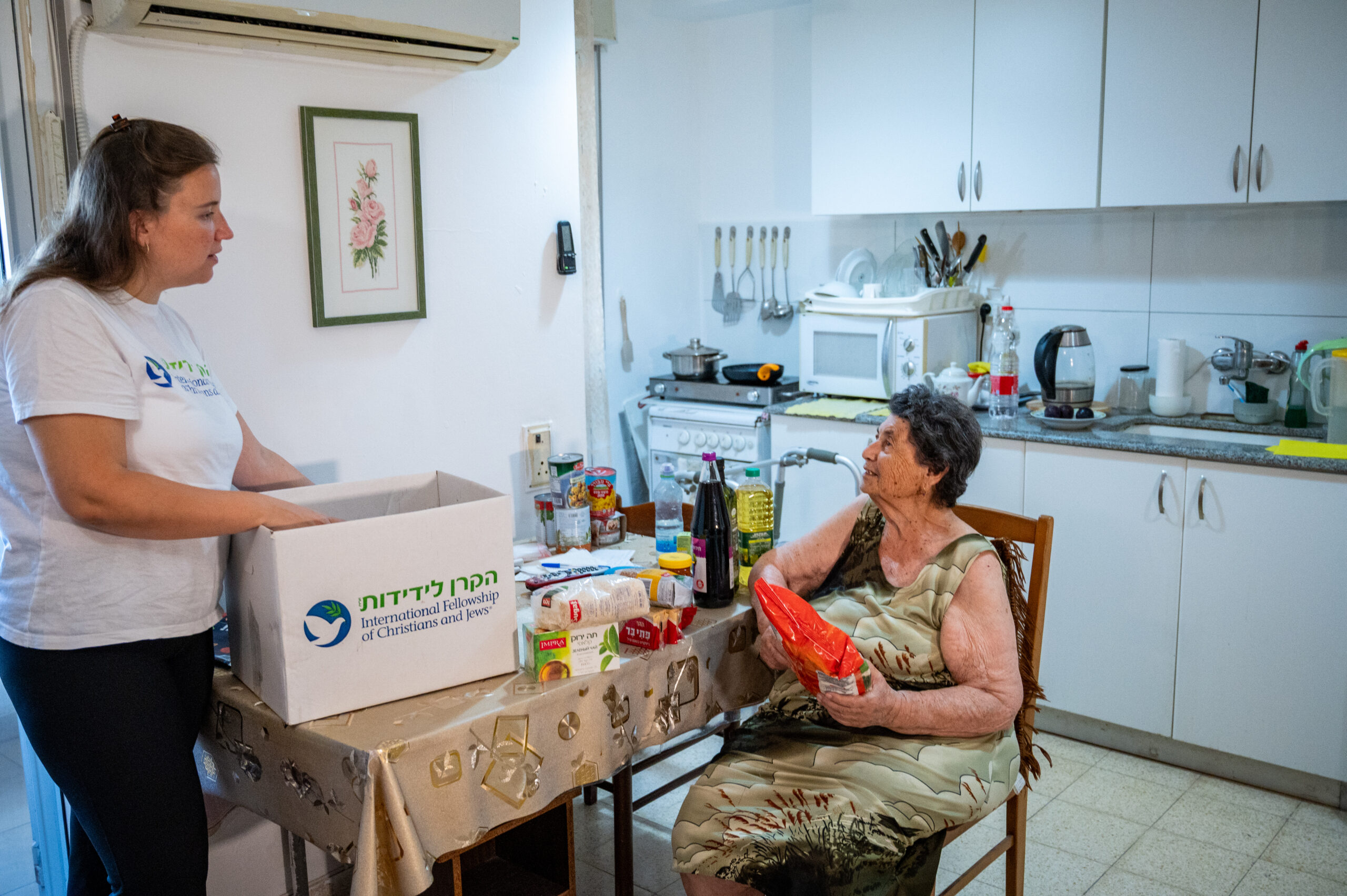
Even before the upheaval of Oct. 7, 2023, Israel was grappling with poverty and the hunger that frequently accompanies it. Five years of continuous emergency — from the COVID-19 pandemic to the current war — have deepened the inequalities that have led to widespread hunger in the Jewish state, experts say. A new study by the Israeli poverty nonprofit Latet found that 32.1% of Israelis — 2.8 million people, 1.3 million of them children — live with food insecurity. “This year, we are meeting more families than ever in need of assistance,” Joseph Gitler, the founder and chairman of Leket Israel, which rescues food that would otherwise be thrown away and distributes it to people in need, told Rachel Gutman for eJewishPhilanthropy. “People who can’t afford to waste also waste. It’s disturbing, but it seems to be a worldwide phenomenon.”
War effects: Rabbi Mendy Blau, Israel director of Colel Chabad, which provides food, medical care and support to Israel’s needy, offered stark figures: “250,000 homes are suffering from extreme food insecurity in Israel. That means these families are experiencing actual food shortages — such as skipping meals, or having less food at meal times.” Of these, he said, 45,000 are elderly, with the remainder being families with children. Ran Rovner, head of marketing and organizational knowledge at the American Jewish Joint Distribution Committee, observed how war creates new pathways into poverty. “A lot of reservists, people who lost their business — if not for the war, they would have gone on with their lives,” he said.
APPLES FOR ROSH HASHANAH
Jewish Federations of North America funds efforts to rebuild farms, orchards in northern Israel
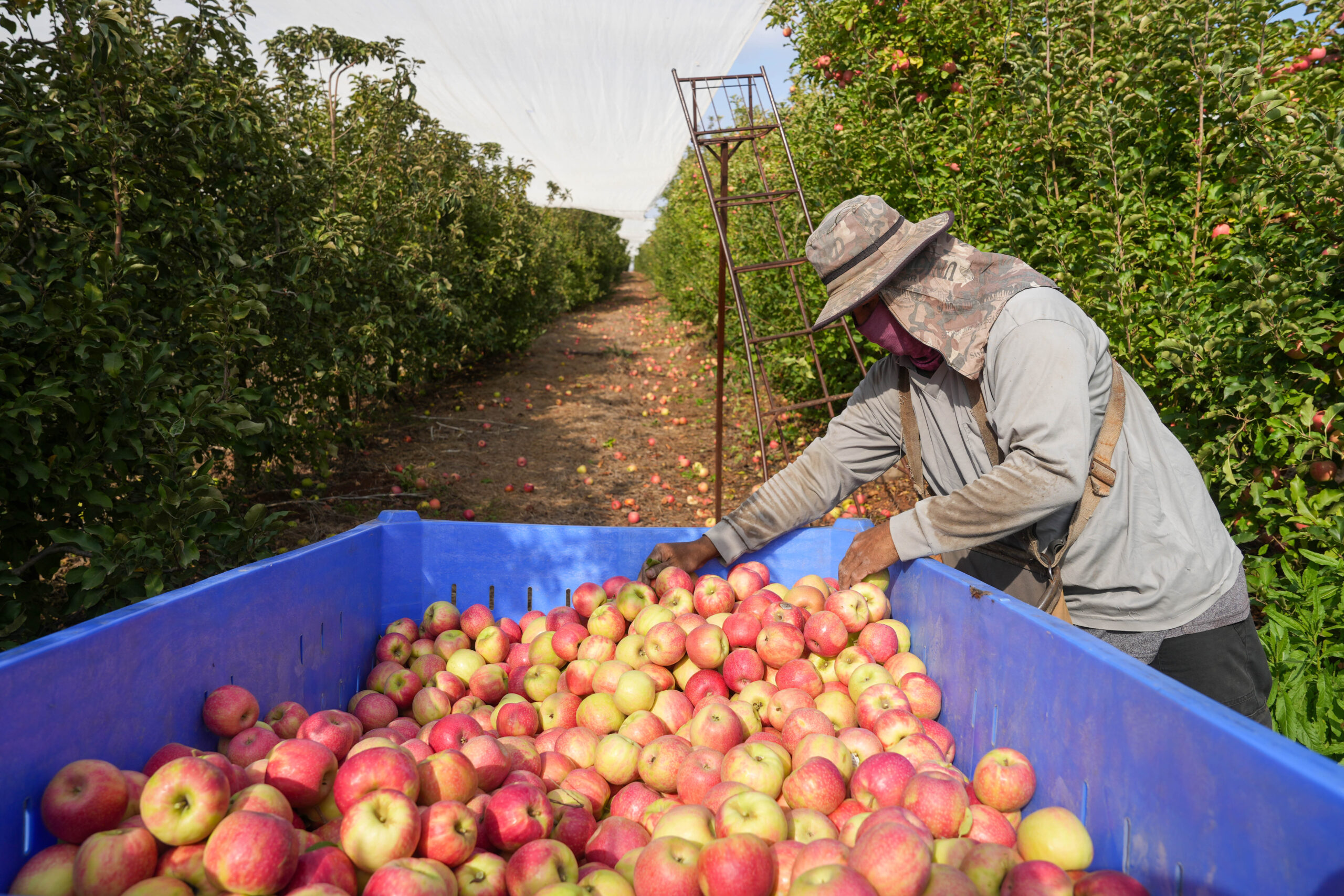
When terrorist groups fire missiles into Israel, one of three things happens: they strike a populated area, they get intercepted by one of Israel’s missile defense systems or they land in an open area. When it’s one of the latter two, people generally breathe a sigh of relief. But not farmers. “That open space is usually someone’s agricultural field,” Danielle Abraham, executive director of the Volcani International Partnerships’ ReGrow initiative, told Jake Gillis for eJewishPhilanthropy recently. “So the missiles cause direct damage. They often spark fires, which also cause more damage.”
Land restoration: Over the course of more than a year of attacks by the Lebanese Hezbollah terror group on northern Israel, there have been many such strikes on “open spaces,” causing more than $100 million in damage to local agriculture, according to a ReGrow study from earlier this year. To address some of that damage, the Jewish Federations of North America, which first worked with ReGrow to assist farmers from the Gaza border area, has again partnered with the group, providing $1.15 million that will help restore over 230 plots of land that were damaged in the war. Once revived, these orchards will yield at least 9 million apples annually.
ROSH HASHANAH 5786
A time for renewal and responsibility
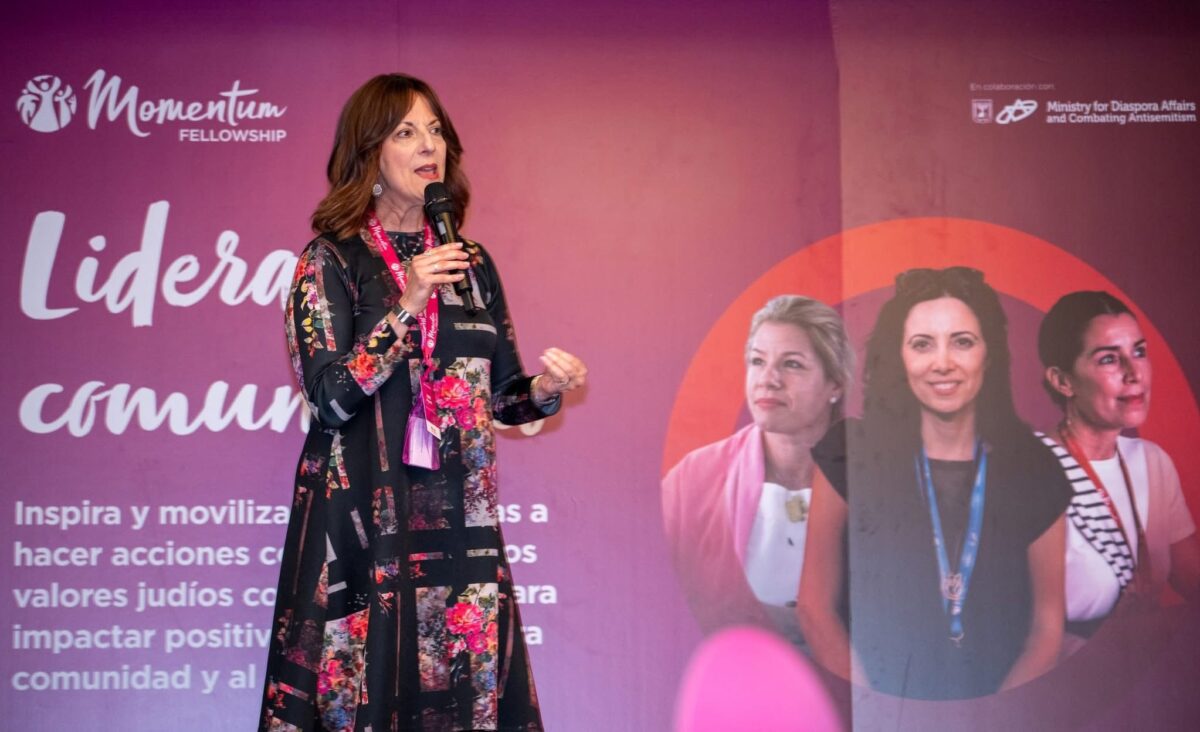
“In 5785, the Jewish women of Momentum from around the world proved that courage and action are contagious,” writes Lori Palatnik, founding director of Momentum, in an opinion piece for eJewishPhilanthropy. “Mothers who had never before spoken publicly in support of Israel found their voices. Daughters saw firsthand that activism can be compassionate, informed and bold. Communities once disconnected were united in shared purpose and love for the Jewish people. These moments — personal, yet profoundly collective — show that the Jewish people are strongest when we are bound together by shared responsibility and care.”
A clarion call: “Rosh Hashanah reminds us that reflection must be accompanied by action. The shofar’s call is not only a summons to personal introspection — it is a call to courage and responsibility. In this new year, it asks us to strengthen our connection to Israel, to build resilient families and to rise above political, cultural and geographic divides. It challenges us to act boldly, to nurture our communities and to be a source of hope and strength for those who look to us for guidance. … And let us embrace the Talmudic wisdom that reminds us God provides the remedy before the affliction: the courage, tools and resilience we have cultivated through the generations are exactly what we need to meet the challenges before us.”
SMALL GESTURES, BIG IMPACT
Rosh Hashanah, resilience and a lesson for an uncertain world
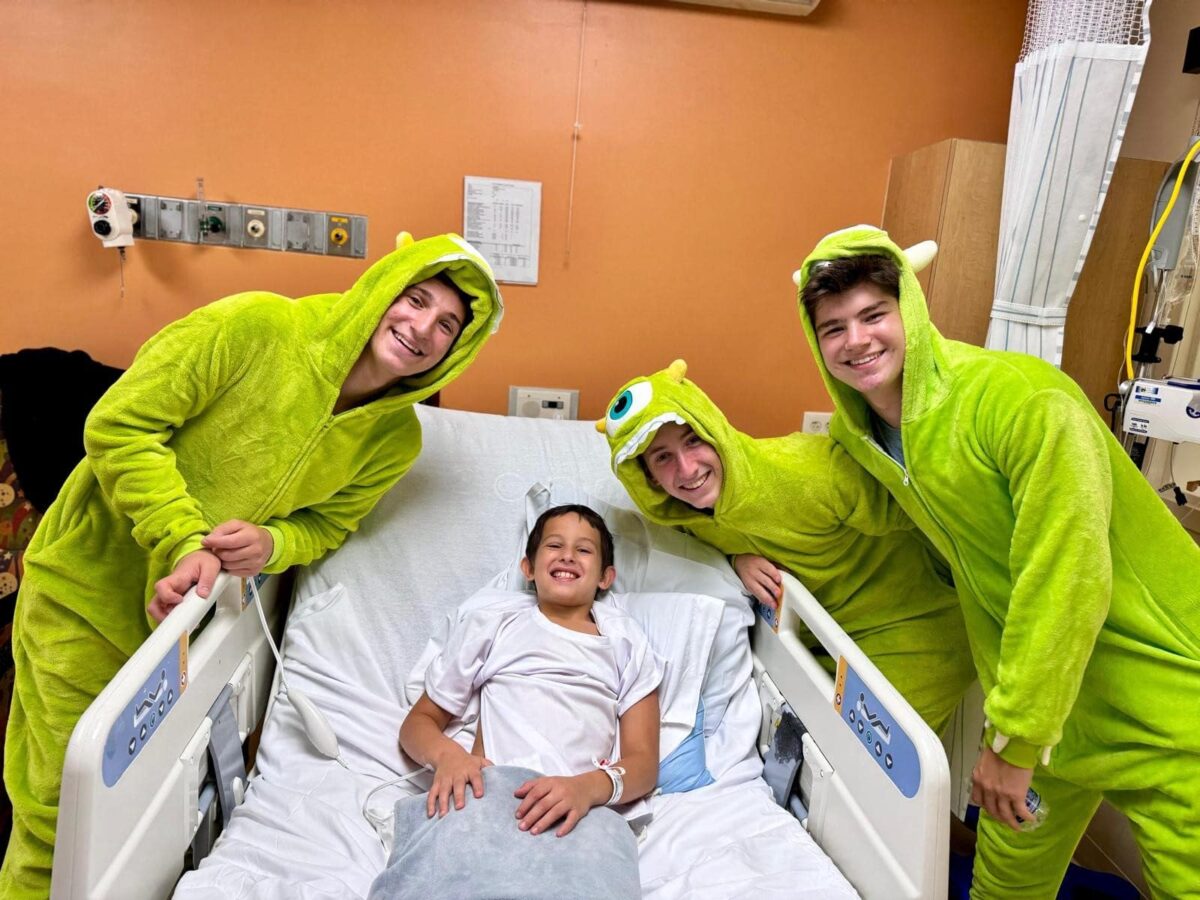
“‘On Rosh Hashanah it is written, and on Yom Kippur it is sealed…’ Unetaneh Tokef, the haunting High Holy Day liturgy, confronts us with an uncomfortable truth: the year ahead is uncertain, and our fates are beyond our control,” writes Rabbi Simcha Scholar, CEO of Chai Lifeline, in an opinion piece for eJewishPhilanthropyeJewishPhilanthropy.
The choice that remains: “In the United States, roughly 15,000 children and adolescents are diagnosed with cancer each year, often without warning. A morning that begins with routine school drop-off can end in a hospital room, surrounded by doctors delivering devastating news. Beyond illness, research shows that more than two-thirds of American children will experience at least one traumatic event by age 16. These are not statistics that live in the margins. They represent families in every community, facing futures they did not choose and cannot control. From these families, we can learn an essential lesson: While none of us can predict the future, we can decide how to respond.”
Worthy Reads
Connecting Through Gratitude: In The Times of Israel, Rabbi Avi Weiss reflects on what it means to wish someone a “shana tovah” in a time of so much turmoil at home and around the world. “Goodness, at its core, is inseparable from gratitude, involving what the rabbis call ‘hakarat hatov’ — recognition of the good. Even the Hebrew word for ‘thank you,’ ‘todah,’ is rooted in lehodot — ‘to acknowledge.’ A true thank you is never perfunctory; it is a humble admission: I could not have done this without you. … Thankfulness requires humility. It acknowledges that we are not self-sufficient, that our lives are interwoven with the care and support of others. In admitting limitation, we begin to experience a deeper sense of wholeness. To say ‘I cannot do everything’ is not a confession of defeat, but an opening to connection. We discover that the very boundaries of our strength and control are what create the space for others to enter our lives. And when we recognize that truth, something remarkable occurs. We begin to notice and be thankful for the small, often overlooked gifts of the other.” [TOI]
Not Off the Hook: In a post on the website of the Jewish Funders Network, Andrés Spokoiny argues that collective responsibility-taking is not a replacement for personal accountability. “The famous phrase ‘Kol Israel arevim ze vaze’ is often misinterpreted. It’s not, ‘All of Israel are responsible for one another’ but, ‘All of Israel are guarantors for one another.’ … That we recite vidui (confession) in the plural helps remind us that all Israel is one body, each person is a limb. We share responsibility for the moral state of our community, even for sins committed by others or those that arise from societal patterns. … However, lately, collective responsibility is becoming a stratagem for avoiding personal responsibility and acknowledging our own mistakes. The plural in the vidui was supposed to be an addition to personal repentance, not a replacement. The vidui comes at the end of a long process of teshuva, introspection, and atonement. With the plural of the vidui we’re meant to take on more responsibilities, not less.” [JFN]
A Critical Public Good: In Nonprofit Quarterly, Jennifer Johnson examines the impact of July’s $1.1 billion cut in federal funding for the nonprofit Corporation for Public Broadcasting — the full amount it was set to receive over the next two years. “CPB distributes about a quarter of that funding to NPR and PBS for national programming. The rest goes to more than 1,500 locally operated radio and television stations, many of them in rural areas. … [Local news outlets] provide residents with news, weather alerts, road conditions, educational programming, and emergency updates. In many rural areas, where phone and internet service can be spotty or unavailable, these stations are often the most reliable source of information. … [N]ational foundations, community and local place-based foundations, and other nonprofits need to recognize the value of supporting public media and nonprofit news in their markets, even if they’ve never put funding toward these areas before.” [NonprofitQuarterly]
Word on the Street
Miami-Dade Mayor Daniella Levine Cava, the county’s first Jewish mayor, is coming under intense pressure to divest the county from its $151 million portfolio of Israel bonds, including from her son, organizer Ted Cava. “I decided to kind of take our family disagreement public,” he told the Miami Herald, “knowing that some of her opponents could use it in bad faith against her”…
WBUR in Boston spotlights a new $600,000 initiative by the Ruderman Family Foundation sending telehealth vans to Boston-area universities to provide mental health services to Jewish students…
The Wall Street Journal reviews Mark Mazower’s On Antisemitism…
A fire broke out in the Chabad of Charlotte County, Fla., which local authorities believe was the result of arson; the letter “J” was also spraypainted outside of the building…
The Jewish Federation of Greater Pittsburgh was hit recently by a cyber-attack…
Edan Alexander, the Israeli American former hostage who was released from Hamas captivity in May, announced he will return to IDF service next month…
Major Gifts
Arnold Ventures has announced $20 million in grants for Maryland youth, which will be matched by the state; this includes $14.4 million each for Maryland community colleges and $5.6 million each for Big Brothers Big Sisters…
Investor Bruce I. Jacobs has donated $60 million to the University of Pennsylvania’s Wharton School, his alma mater, to launch a master’s of science program in quantitative finance …
The Dianne and Irving Kipnes Foundation donated $18.2 million to Canada’s University of Alberta to establish an eponymous health research institute…
The Jewish South African Mauerberger Foundation Fund is donating $57,600 (ZAR 1 million) to the African nonprofit Gift of the Givers, which will go toward humanitarian aid efforts in Gaza…
The Ballmer Group is awarding a three-year, $3.1 million grant to New America, a Washington-based nonprofit think tank, for an initiative to combat evictions…
Investor and Democratic donor George Soros donated $10 million to the party’s new effort to redraw California’s congressional districts…
Transitions
Robert French has been hired as the next CEO of the Jewish Federation of Greater Dallas; French most recently served as CEO of the Jewish Federation of Greater New Orleans…
Pic of the Day
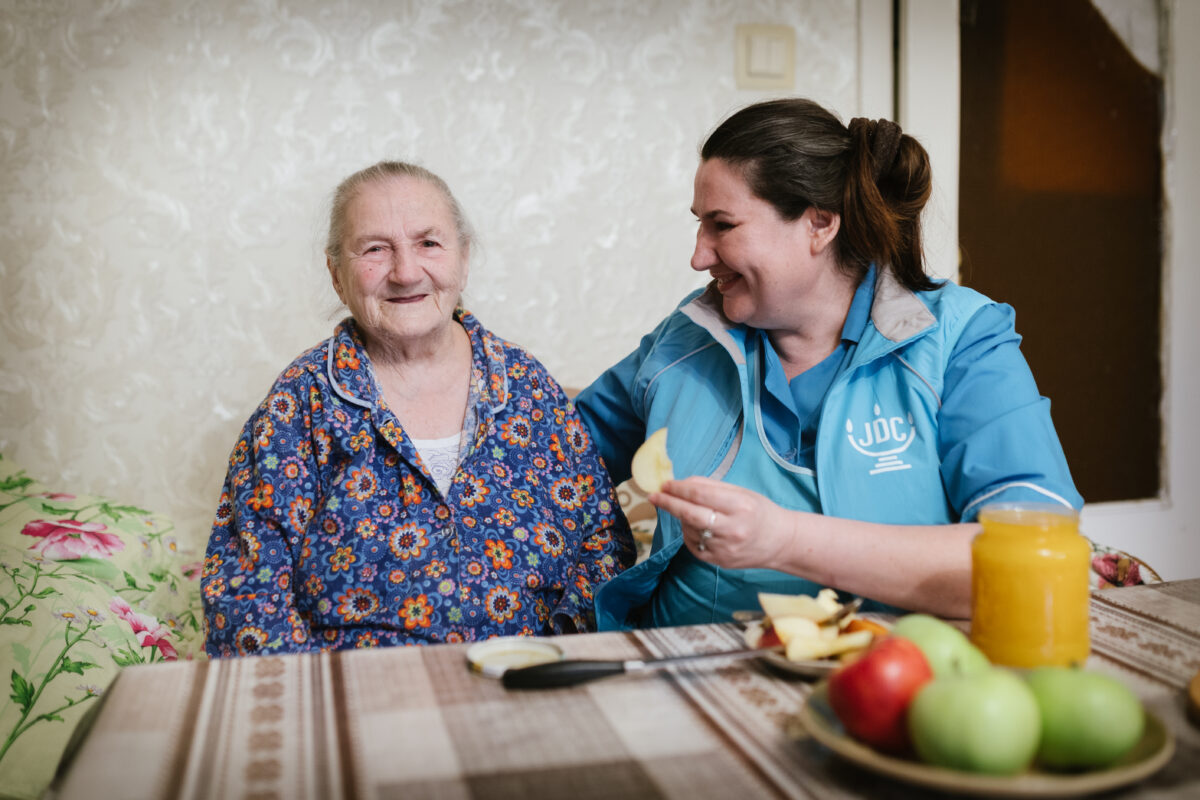
An American Jewish Joint Distribution Committee aid worker shares an apple dipped in honey with Khona Belaya, 89, of Bender, Moldova, ahead of Rosh Hashanah.
“Khona is one of tens of thousands of elderly Jews receiving life-saving services from JDC throughout the year and one of the more than 8,000 needy Jewish elderly and families that receive special holiday food sets, including honey and other festive treats,” the JDC said in a statement.
Birthdays
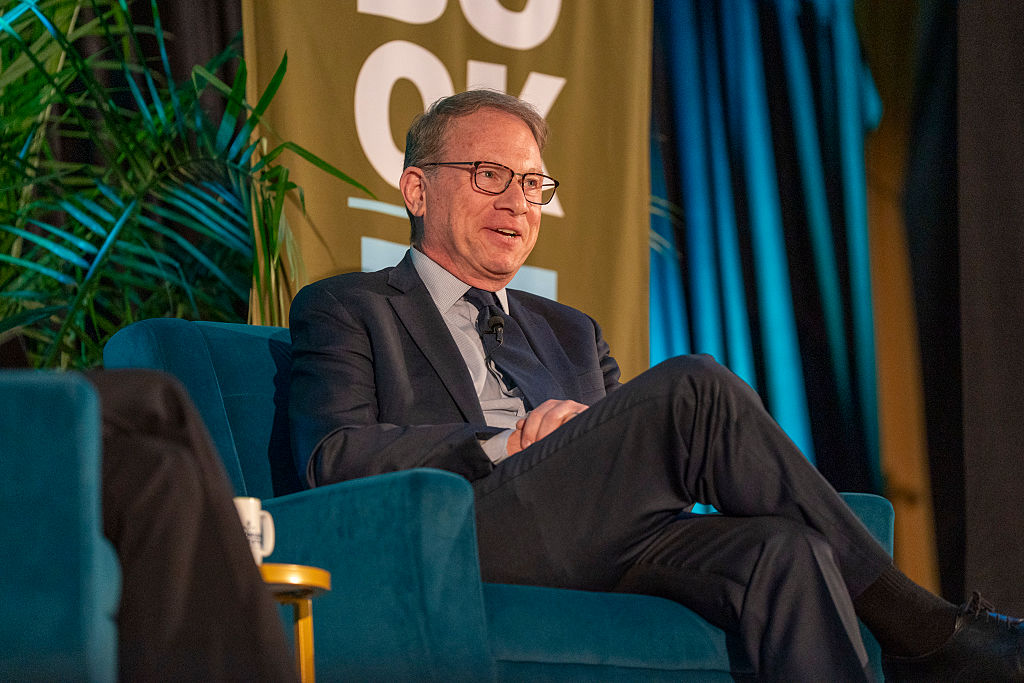
Editor-in-chief of The Atlantic, Jeffrey Goldberg turns 60…
Brooklyn, N.Y., resident, Jay Kanter… Former president of the Jewish Federation of Greater Los Angeles for 16 years, now a consultant at the L.A.-based Diane and Guilford Glazer Philanthropies, John Fishel… Research laboratory director, biochemist and professor in medicine based in Jerusalem, Yosef Gruenbaum turns 76… Professor of journalism at Columbia University and a former reporter for The New York Times, Ari L. Goldman turns 76… Former publisher of The New York Times, Arthur Ochs “Pinch” Sulzberger Jr. turns 74… Senior political analyst at CNN from 2007 until 2024, Gloria Borger turns 73… Clarinetist who performs klezmer, jazz, classical music and avant-garde improvisation, David Krakauer turns 69… U.S. Ambassador to Romania during the Trump 45 administration, Adrian Zuckerman turns 69… Nobel Prize laureate in 2011, astrophysicist and professor at UC-Berkeley, Saul Perlmutter turns 66… President of Israel since 2021, Isaac “Bougie” Herzog turns 65… Director of development at the Los Angeles Conservancy, Elizabeth “Liz” Leshin… Former member of the Knesset for Likud, Osnat Hila Mark turns 58… Senior writer and historian for the Jewish Federations of North America, he is the author of Pastrami on Rye: An Overstuffed History of the Jewish Deli, Ted Merwin… Founder and CEO of Terravet Real Estate Solutions, Daniel Eisenstadt… Founder and CEO at P3 Media, he has won three Emmys, a Peabody Award and a Polk Award, Adam Ciralsky turns 54… Arlington, Virginia resident, Karen Elyse Simpson… Journalist and screenwriter, she has reported for The Wall Street Journal and The New York Times, and is the author of Chasing Hillary, Amy Chozick turns 47… Former minister of defense of Georgia, now an entrepreneur in the U.K., Davit Kezerashvili turns 47… Actress and theater director, she is best known for her role as Quinn Perkins in the ABC political drama series “Scandal,” Katie Lowes turns 43… Film director, producer, screenwriter and television director, Jordan Charles Vogt-Roberts turns 41… Hungarian politician who once served as a member of the European Parliament, Csanád Szegedi turns 43… Founder and CEO of Henry PR, Bryan Leib… Founder of Golda, a Jewish lifestyle newsletter, Stephanie Taylor Butnick… Former entertainment reporter, journalist and fashion designer, now a vice president at J.P. Morgan Private Bank, Baruch Yehudah Shemtov turns 38… Partner at Winning Tuesday, a political marketing agency, Jared Sichel… Associate director for antisemitism policy at AJC Global, Alyssa Weiner Sandler… Co-founder of Leman Mercer, Kyle Price…


 Add EJP on Google
Add EJP on Google